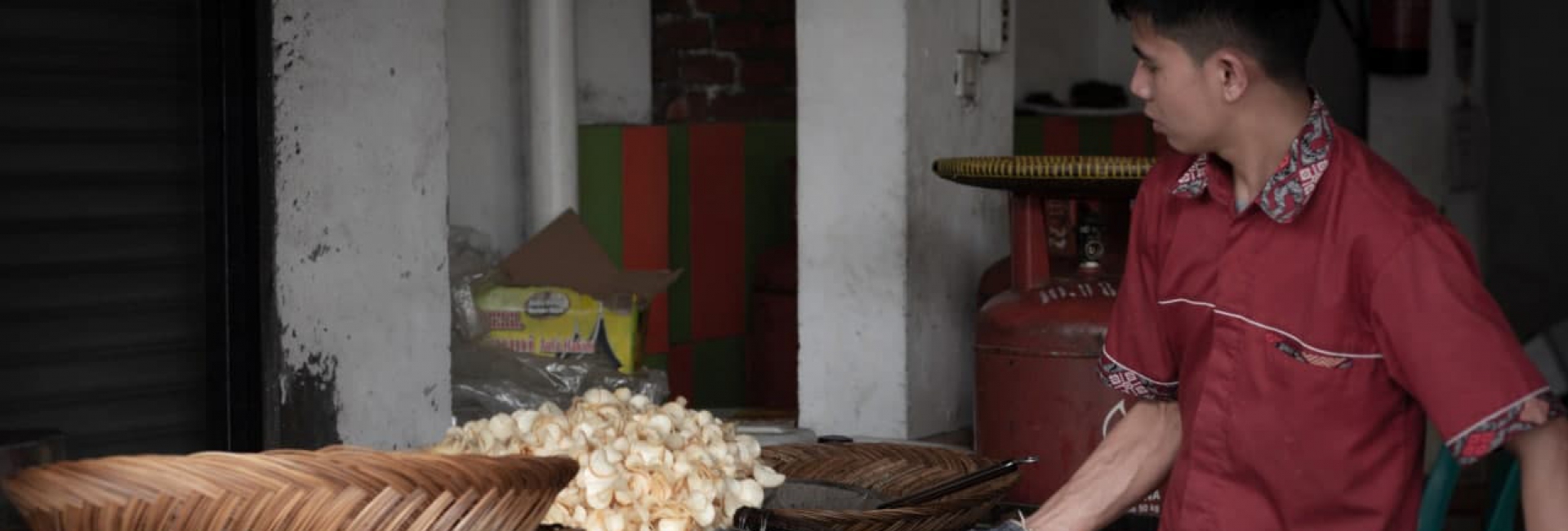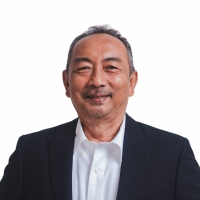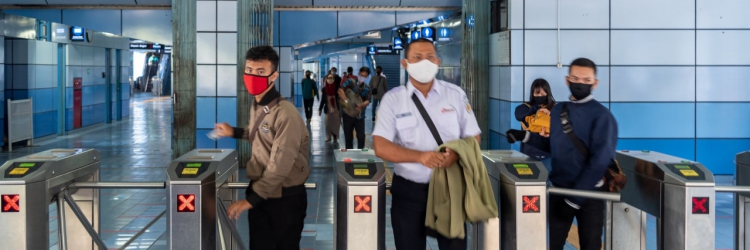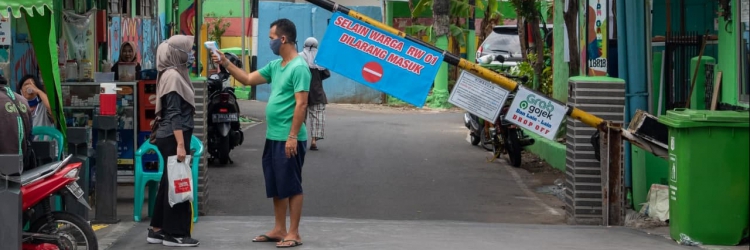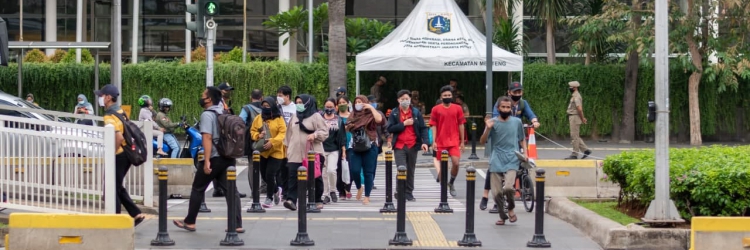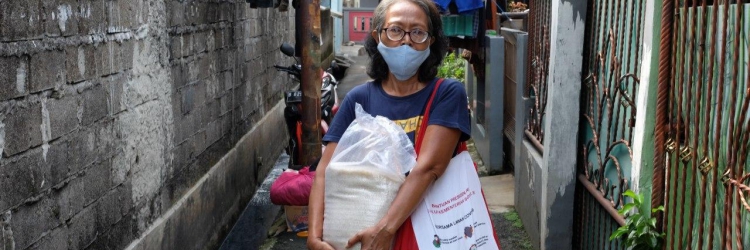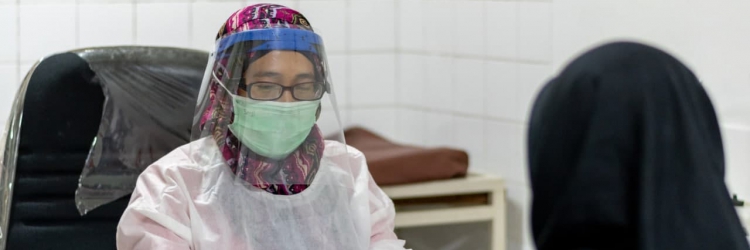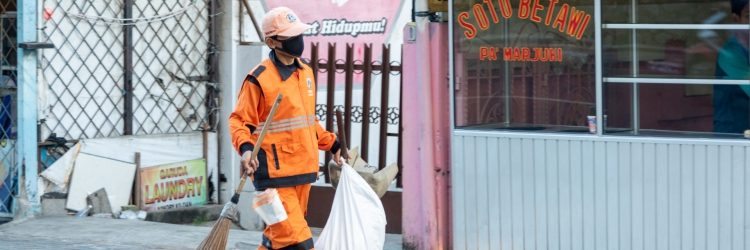Like a waking dream, people were caught off guard when the COVID-19 pandemic hit the world, putting their sources of income under strain. People lost their jobs and their income decreased significantly. A few of them had attempted to switch jobs, only to earn much less than usual.
What happened to the residents of Desa (Village) D (Badung, Bali) perfectly mirrors this situation. Desa D was a rich village. Several of its richness indicators were that its village budget ranged between 20 billion and 30 billion rupiah per year and that it had almost zero poverty. In early 2019, only 3 households (out of 5,540 households or 22,084 people) in this village were poor. However, the COVID-19 pandemic had shattered much of this privileged circumstance. The number of its poor residents has now dramatically increased.
According to the head of Desa D, those residents are considered temporarily poor. Their flow of income is momentarily interrupted indeed, but they have a good chance of restoring their income once the pandemic ends. Most of these people are experienced workers in the tourism and trade sectors.
Based on the combined data collected by Tim Satgas Gotong Royong[i] (Customary Village) and the Village Volunteers (Desa Dinas[ii]), in May 2020, a significant number of Desa D residents were economically severely affected. Based on the data, 171 households were decided to receive the Direct Cash Transfer (BLT) sourced from the Village Fund and 900 households to be nominated (and had been approved) to receive the Social Cash Assistance (BST) from the local social agency.
Owners of micro, small, and medium enterprises (MSMEs) in the village are also affected by the unforeseen COVID-19 attack. A chicken meat supplier, Pak Gede, for example, had a turnover of around 800–1,000 kg of meat per day before the pandemic. These days, however, the amount has decreased to just 100–200 kg; and only after 1–3 days later could this amount of meat be sold. Consequently, Pak Gede's profit now shrinks from Rp500,000–Rp600,000 per day to around Rp100,000 per day.
Such an economic shock is also experienced by our respondents who live in Jakarta as migrants and have to return to their native places, such as Boyolali and Banjarnegara.
Pak Sus is an example of someone who was trying his luck conquering the hardship of life in Jakarta. Unfortunately, not too long after he got his life on track, this migrant from Boyolali had to witness how his life crumbled before his eyes and must concede for now.
With the savings he accumulated from 12 years working in a factory and 1 year partnering with his friend selling soto Boyolali[iii], in September 2019, Pak Sus managed to open his own food stall in Pasar Klender area. This first business of his went quite successfully. Pak Sus could even hire four employees with a net operating profit of around 5 million rupiah per month. However, the COVID-19 storm then came, “ripping off” his stall.
Around the end of May 2020, or two months after the COVID-19 stirred up a crisis to the financial situation of every household and to the business climate, all affected respondents still managed to keep their head above water. They took every possible way they knew to get around the situation by making use of their jobs, personal potentials, surroundings, and the social network they had built.
In general, how the respondents coped with the situation includes a number of patterns and/or a combination of some of them.
Cutting Down Food Consumption to a Maximum Extent
Approaching the fasting month, Mas Haik was considering returning to his village since his income as an online motorcycle taxi driver had dropped significantly from Rp100,000–Rp150,000 per day to only Rp20,000–Rp30,000 per day.
Since the Large-Scale Social Restrictions (PSBB) was applied, Mas Haik was prohibited from taking passengers, as the feature to receive orders from passengers in the online application had been disabled by the company. Only features involving no passenger were enabled. However, only a few of such orders were made.
“In the past, when things were still normal, I had to turn off the application only to be able to take a bath. I was afraid that while I was taking a bath, someone would place an order. I also turned it off when I ate. ... Let alone, when I went to bed. But now, my goodness, not only when taking a bath, I don’t even turn the application off when I am asleep, [yet] no orders were made,” said this migrant from Pemalang who now lives in Cilangkap.
So why did he wish to go back to his hometown? His reason was simple:
“... behind my house, my family has a small yard where we grow our own vegetables, which we can eat [as side dishes].”
However, he gave up the idea, not because of the ban on “mudik”[iv] imposed by the government, but because he did not have enough money to cover his transportation expenses. With significantly less income, the first possible step he could take was to be as frugal as he could in his daily food consumption.
“Well, how do I put it? I combine the iftar [after-sunset meal to break the fast] and sahoor [pre-dawn meal before starting the fast], Sir. It is [instant] noodle, for sure. In the front yard of our landlord’s house, an edible plant we can use in cooking vegetable soup [gedi/sunset hibiscus leaves that look like the papaya leaves] is grown. I thank God for this [I can cook it with the instant noodle], Sir, it’s conveniently located right in front of our rented house. The neighbors [also] grow chilies. I take five of them [to cook the instant noodle] at night, and tell [the owner] about it the next day.”
While they might have been better off than Mas Haik, other respondents whose income also significantly decreased, or who even had no income at all, and had no sufficient savings did the same. They reduced their food consumption whenever they could since they were unsure when the impacts of the pandemic would end.
Going Back to Hometown
Some other respondents chose to return to their hometown for various reasons.
In early March 2020, before the PSBB was effective, Pak Sus closed his food stall and returned to his hometown. The few buyers, inexpensive cost of living in the village, and the assistance from relatives were three primary reasons why he chose to return to his hometown.
“[Buyers started] to come less and less frequently, and I’ve been losing money; this has been going on for almost two weeks. [People] were afraid of going outside. … Almost nobody came, so I went home [to Boyolali],” said Pak Sus.
“It’s easy to be frugal when we are in the village, Ma’am. We don’t need much [money to spend]. Also, our relatives too [can help]. Food is the least of my concern, I don’t worry much about it. Yesterday [a relative] also came here to give some [staple] food for us to eat,” he added.
About his return to his hometown, initially, Pak Sus thought that the impact of the COVID-19 pandemic would not last too long. For this reason, he kept some of his soto ingredients, such as beef, cow’s trotters and lung, eggs, chicken meat, and seasonings, which were worth around Rp5 million, inside his refrigerator at his rented place.
Before returning home to Boyolali, Pak Sus topped up his electricity credit for one-month usage. However, alas, his prediction that the pandemic would end soon was false and the electricity credit at his rented place had run out. All the ingredients he kept had turned to waste. Until mid-May 2020, Pak Sus had not yet returned to Jakarta since the PSBB was still effective.
Meanwhile, Ibu Sriwi, one of Pak Sus’ employees, decided to return to her home village in Boyolali because no other job opportunities were available in Jakarta. In her village, she went back doing her old job as a sidewalk vendor selling grave flowers.
Bu Sriwi considered that living in the village was safer because she could avoid the COVID-19 transmission and felt more peaceful since she could be together with her children.
“[Once I arrived,] I immediately started my job since the situation in Boyolali was by far safe. The market operated as usual; no closing down whatsoever. Everything was normal, still crowded, until now. Nothing was different in Boyolali [compared to the time before the COVID-19 pandemic]. In Boyolali, [I] feel safe [peace] too because I am surrounded [with] my family,” she said.
Reducing Production Costs
Laying off employees without paying their wages and reducing their wages have been common practices to reduce business operating costs. This is done both by MSMEs and large-scale companies. Pak Sus, for example, had no choice other than to lay off his four employees because he had to close his food stall.
Pak Gede, who supplied chicken meat to hotels and cafés, had to lay off his two employees since his business turnover declined dramatically.
“I employed two people, Sir, because I was (also) assisted by my wife and my son, Sir. I have temporarily laid off my employees, Sir, because I could not afford to pay [them]. ... Before Nyepi [Balinese religious holiday], they already went back home [to their native places, namely Jember and Banyuwangi, East Java],” said Pak Gede.
Laying off their employees set both Pak Gede and Pak Sus free from their responsibility for paying the employees’ wages.
Unlike the two cases above, Pak Endi, who provides a party equipment rental service, still paid his employees 50% of their full salary even though his business had stopped altogether. In his opinion, only a handful of people are skilled enough in putting up tents and decorating wedding parties. For this reason, he still paid his employees to prevent them from looking for other jobs.
Mbak Loly (Kelurahan A, East Jakarta) and Ibu Etni (a migrant from Banjarnegara) were laid off without payment. Coincidentally, these two respondents worked in the same field, product marketing.
Mbak Loly, who worked as a salesperson for a branded bag product at Cijantung Mall, had been laid off since 27 March 2020 and, until the time the interview was conducted (12 May 2020), remained unemployed. Meanwhile, Ibu Etni, a salesperson for made-in-Korea medical equipment who had been laid off from mid-March 2020, did not have a job until 31 May 2020.
Taking Advantage of Existing Opportunities
For entrepreneurs, as long as there is still an opportunity, they will usually do everything in their power to take advantage of it. Before the COVID-19 pandemic, Pak Gede had three big customers: two cafés in Jimbaran and Kuta (not regular), and one hotel in Kuta. When these big customers ceased their business operations, Pak Gede did not easily give up.
Pak Gede continued selling chicken meat by opening a kiosk in front of his house and sold them in small quantities. He also distributed his chicken meat to small sellers around Kuta and Denpasar.
“Now we have no choice but to change strategies since most hotels are closed, [so] no delivery [of the chicken meat] have been made [to any hotel] at all, nothing. Thus, I have no other choice but to open a small kiosk in front of my house,” said Pak Gede.
Bu Ati, a resident of Kelurahan C in East Jakarta, has been selling children’s snacks, such as cold beverages for kids and otak-otak[v], for the past two years at her rented house. The COVID-19 pandemic made her income dramatically decrease from around Rp100,000–Rp150,000 per day to an average of Rp5,000 per day. However, Bu Ati remains persistent in her business, even though it is unprofitable. No other economic opportunities are available for her. However, this choice of hers at least keeps her children from snacking randomly outside.
“... So, you see, we basically eat the food [I sell],” said Bu Ati, who has 12- and 9-year-old children.
Ideas of Adding More and Switching Jobs
The respondents generally think that the pandemic will end and the economic situation will resume like it normally was in the past. The problem is that nobody knows when it will end. During these 2–3 months, some of these respondents have not yet come up with any plan to find alternative jobs.
Some others have started thinking about augmenting their income by doing additional jobs. Bu Wati, who works in a garment factory, for example, has planned to find a part-time job at a home sewing industry now that she has so much free time on her hands. Unfortunately, her plan did not come to fruition since she knows exactly that most home sewing industries at the moment receive less orders.
The orders Pak Tono, an online taxi driver in Cilangkap, received had started to decrease two weeks before the PSBB was implemented.
“Once, I even had an entire week without a single order,” he admitted. As a result, during that time
During the PSBB, in one day at most Pak Tono received three orders with a total income of around Rp50,000–Rp60,000 that it
“... [seems like it’s] not even enough to cover the gas. For a long [distance] drive, I get at most Rp100,000, but I have no passengers when returning home. So, it was just enough for the gas”.
Realizing that he cannot depend his life only on one job, Pak Tono has planned to seek more sources of income by selling something. He even has contacted onion and egg distributors. However, this plan could not be executed since the distributor applies a minimum purchase of one quintal. Pak Tono backed down since he neither had the money nor the access to any loan.
Selling Assets
Of all the respondents, Pak Endi is the only one who has sold several of his assets to help him get through the situation, either for paying his employees or for meeting ends meet. As a relatively big party equipment rental company owner, the respondent had managed to save from his profits to buy a Toyota Rush as his private car, a Suzuki pickup truck, a truck that serves as an operational vehicle, and a plot of vacant land not too far from his house.
The COVID-19 pandemic has made Pak Endi’s business almost bankrupt to the extent that he earns Rp0. In response to this, this migrant from Lampung who now holds a Jakarta residential identity card, has even sold his private car to pay the rental renewal fee for the place where he stored his party equipment and to meet other needs.
This, however, is not enough. In addition to the vacant land that had been sold, his operational truck will soon be released too and is now under the process of being sold to a leasing company.
For How Long?
The impact of the COVID-19 pandemic on the economic life/well-being of some people is real. However, these people’s resilience against the pressure of this pandemic has its limit. The respondents are those immediately affected by the pandemic. Beyond this group of people, many other community groups may experience the same, or perhaps more severe, impact sooner or later.
Given that the economic shock they are now facing is due to the COVID-19 pandemic, the issue should end once the pandemic is over. Yes, the problem does sound that simple. But is that even realistic?
The answer is certainly not, as even until this moment, the COVID-19 has not even stopped spreading, neither at the local, regional, national, nor international levels. The easing of the PSBB in DKI Jakarta and many other regions indeed has managed to bring the economic activities back to life. However, not all sectors are equally revived and this leaves many groups in the society to suffer even longer.
------------------------------------------------------
[1]Literally, the Mutual Cooperation Task Force.
[1]In the elucidation of Law No. 6/2014 on Villages, it is suggested that village or the same entity referred to by other names possesses those characteristics commonly shared in all regions across Indonesia, whereas customary village or the same entity referred to by other names have different characteristics from those of a village in general, mainly because the customs have strong influence over the local government system, local resources management, and the sociocultural life of its residents. The respondents refer to the term village in the general sense as desa dinas.
[1]Mixed chicken soup served with rice, a specialty from Boyolali.
[1]Returning to one’s hometown or village during a religious holiday.
[1]A fish cake made of ground fish meat mixed with spices and wrapped into leaf parcels.


